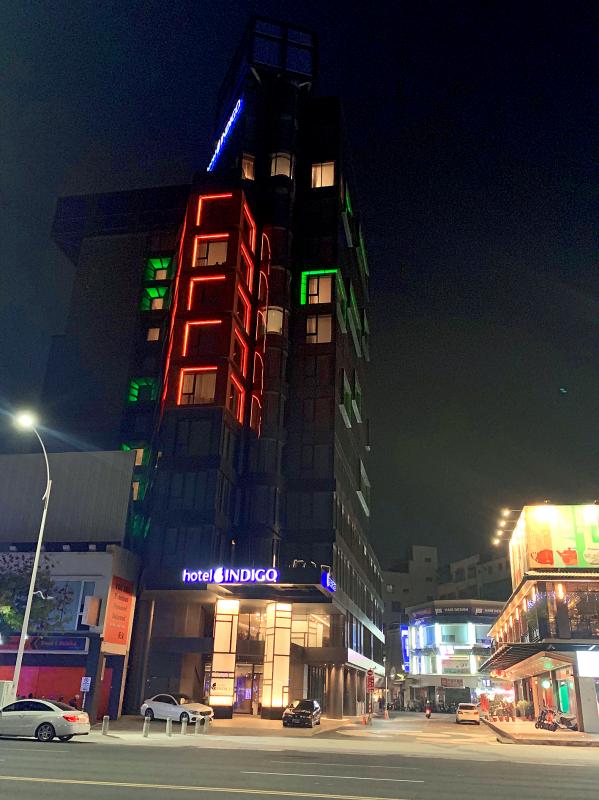Taiwanese hospitality service provider Leefang Group’s (李方酒店管理集團) Hotel Indigo Kaohsiung Central Park (高雄中央公園英迪格酒店) is to be auctioned off in the foreclosure market after the sales of properties elsewhere failed to resolve the group’s cash strains.
The hotel with 129 guest rooms, which is in a 12-year management contract with InterContinental Hotels Group PLC, said in a statement that the auction would not affect its operations.
The brief statement came after local Chinese-language media over the weekend reported on the upcoming auction.

Photo: CNA
“The hotel maintains normal operations and will continue to deliver quality services,” Indigo Kaohsiung Central Park said, adding that its management team would give top priority to protecting the rights of hotel members and guests.
The fashion-minded property, which opened in central Kaohsiung in December 2016, is profitable, but Leefang Group’s debt problems have led to the foreclosure, local media said, without citing sources.
Financial stress has driven Leefang Group, which started as an accounting company and grew into a property investor and hospitality firm, to sell its Royal Seasons Hotel Taipei (皇家季節酒店) on Nanjing W Road and Airline Inn (頭等艙酒店) in Taipei’s Ximending (西門町) area.
The company’s founding couple, Lee Ming-sung (李銘松) and Fang Su-dei (方素蝶), have incurred considerable debt to finance a plan to convert an old retail complex they had acquired years earlier into a luxury hotel under the La Meridian brand in central Taichung, the reports said.
The couple for years poured money into renovating and decorating the planned hotel, but last year decided to quit the project after the hospitality industry was hit by the COVID-19 pandemic, they said.
However, the decision came too late to reverse the group’s financial standing and creditors filed a foreclosure request for Indigo Kaohsiung, they added.
The couple also sold the Hengyang branch of the budget Space Inn (太空艙旅舍), which they own, and an apartment on Taipei’s Dunhua S Road to pay their debts.
Indigo Kaohsiung, with 15 floors above ground and three below, sits on a 384 ping (1,2670m2) plot of land, and has an asking price of NT$2.91 billion (US$102.14 million), foreclosure data showed.
The group is also seeking buyers for its hotel investment in Taichung at a price of NT$8 billion, as well as Space Inn’s Xinyi branch, the reports said.
The couple have made a fortune from property investments. They gained renown by selling a plot of land in Ximending to a local life insurer at an unprecedented price, raising their net worth to more than NT$10 billion, the reports said.

The US dollar was trading at NT$29.7 at 10am today on the Taipei Foreign Exchange, as the New Taiwan dollar gained NT$1.364 from the previous close last week. The NT dollar continued to rise today, after surging 3.07 percent on Friday. After opening at NT$30.91, the NT dollar gained more than NT$1 in just 15 minutes, briefly passing the NT$30 mark. Before the US Department of the Treasury's semi-annual currency report came out, expectations that the NT dollar would keep rising were already building. The NT dollar on Friday closed at NT$31.064, up by NT$0.953 — a 3.07 percent single-day gain. Today,

‘SHORT TERM’: The local currency would likely remain strong in the near term, driven by anticipated US trade pressure, capital inflows and expectations of a US Fed rate cut The US dollar is expected to fall below NT$30 in the near term, as traders anticipate increased pressure from Washington for Taiwan to allow the New Taiwan dollar to appreciate, Cathay United Bank (國泰世華銀行) chief economist Lin Chi-chao (林啟超) said. Following a sharp drop in the greenback against the NT dollar on Friday, Lin told the Central News Agency that the local currency is likely to remain strong in the short term, driven in part by market psychology surrounding anticipated US policy pressure. On Friday, the US dollar fell NT$0.953, or 3.07 percent, closing at NT$31.064 — its lowest level since Jan.

The New Taiwan dollar and Taiwanese stocks surged on signs that trade tensions between the world’s top two economies might start easing and as US tech earnings boosted the outlook of the nation’s semiconductor exports. The NT dollar strengthened as much as 3.8 percent versus the US dollar to 30.815, the biggest intraday gain since January 2011, closing at NT$31.064. The benchmark TAIEX jumped 2.73 percent to outperform the region’s equity gauges. Outlook for global trade improved after China said it is assessing possible trade talks with the US, providing a boost for the nation’s currency and shares. As the NT dollar

The Financial Supervisory Commission (FSC) yesterday met with some of the nation’s largest insurance companies as a skyrocketing New Taiwan dollar piles pressure on their hundreds of billions of dollars in US bond investments. The commission has asked some life insurance firms, among the biggest Asian holders of US debt, to discuss how the rapidly strengthening NT dollar has impacted their operations, people familiar with the matter said. The meeting took place as the NT dollar jumped as much as 5 percent yesterday, its biggest intraday gain in more than three decades. The local currency surged as exporters rushed to